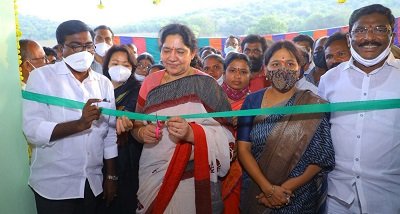Inside BENEO’s new pulse plant: pioneering sustainable protein from faba beans
Both the units are wholly owned by tribal women, who were trained in food processing and entrepreneurship at ICRISAT
Satyavathi Rathod, Minister for Scheduled Tribes, Women and Child Welfare of India’s Telangana state, recently inaugurated a moringa (drumstick) processing unit in the state’s Khammam district and a dry mix (ready-to-cook foods) unit in Bhadrachalam. Both the units are wholly owned by tribal women, who were trained in food processing and entrepreneurship at the International Crops Research Institute for the Semi-Arid Tropics (ICRISAT).
Sri Lakshmi Ganapathy Dry Mix Unit will supply ready-to-cook Jowar meal (Upma mix) and ready-to-cook multigrain meal (Khichidi mix) to government nutrition programs and anganwadis in the tribal region. Sri Rama Moringa Processing Industry will sell moringa powder in markets.
“The food products being produced in these units have very good nutritive values. Both children and adults can consume them. These will be supplied to children in schools, ashram schools and anganwadi centres to keep them healthy and help them grow. Plus, the units are providing employment to tribal women,” the minister said during the inauguration.
ICRISAT’s Agribusiness and Innovation Platform (AIP) established the unit in collaboration with partners and has implemented two other programmes as part of the collaboration – Nutri-Food Basket programme (March 2017) and Giri Poshana (September 2018).
The women will produce hygienically packed, safe and nutritious foods in the units, which are designed and equipped with machinery as per guidelines of Food Safety and Standards Authority of India (FSSAI). The food products will be sold under the Girijan Co-operative Corporation (GCC) brand as well as in the open market.
“ICRISAT cherishes the successful partnership with the Department of Tribal Welfare in this significant move towards women empowerment. This project has leveraged locally available nutritious dryland crops to support the economic independence of tribal women while ensuring means of nutrition for their communities,” said Dr Jacqueline d’Arros Hughes, Director General, ICRISAT.

